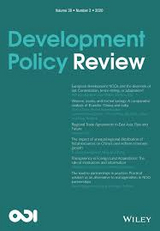
How earmarking has become self-perpetuating in UN development co-operation
Baumann, Max-OttoExternal Publications (2020)
in: Development Policy Review 39 (3), 343-359
DOI: https://doi.org/10.1111/dpr.12504
Open access
The share of earmarked funding to the UN’s development pillar has risen to a record level of 79% (2018) of its total revenue/spending. This poses severe implications for the organizational efficiency, aid effectiveness, and multilateralism of the UN. Reforms have not been able to stem the trend towards earmarked funding, raising the question of what explains the continued rise of earmarking in the UNDS. This article aims to add a new perspective on earmarking, specifically in the UN. It tries to explain not the root causes of earmarking, but the dynamics of the significant rise over the last decade. The argument is that earmarking has been driven by three vicious circles: by the rational factors associated with a collective action breakdown, a change in norms of appropriateness, and institutional fragmentation. The article draws on funding data from the UN, on 65 interviews with UN staff and donor representatives conducted in the context of a recent research project, and on document analysis. Special attention is given to two donors, Sweden and Germany, dedicated multilateralists that have increased their earmarked resources in recent years. The findings put a question mark behind the premises that have so far guided practical efforts by the UN and member states to reduce the share of earmarked funding. They suggest that more fundamental changes to rules and incentives are required to rebalance the UN’s funding towards core contributions. Four specific recommendations are derived from the analysis.

